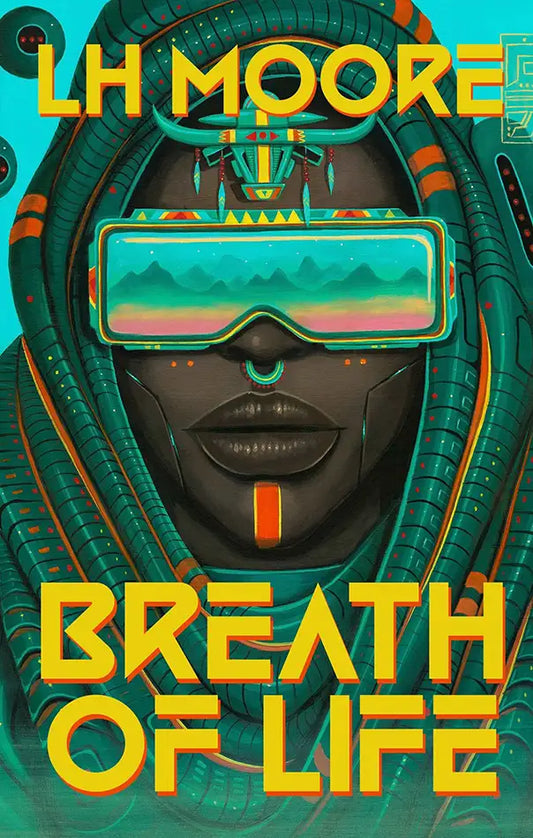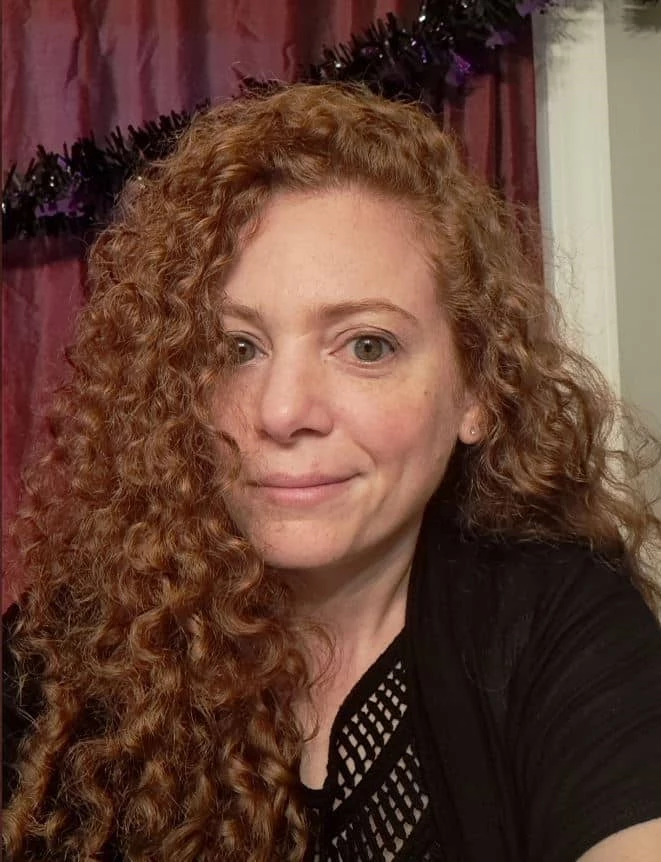
“The Laura Ingalls Experience” is part historical re-enactment tourism, part LARP experience, part Disneyland-esque escapism. Ella seems to be the only one who isn't sure why she's here, and she surely isn't 100% prepared to be here. Surrounded by the assumptions of strangers, can Ella find herself in the stories of her youth? She has a decision to make, and it needs to be made soon. Against the backdrop of wagon wheel ruts, this is far more than just a journey to a famous home.
One of the many things I loved about this story was the connection between the frontier as endured by the Ingalls family, and next frontier humanity faces – the stars. As we venture outbound, what will we take with us, knowing there will be few resupply opportunities? What diseases will we survive, who will we choose to travel with, what will have value, and what will suddenly not be worth carrying?
Like the beauty of nature, this is a story that's here, patiently waiting for you. It's waiting for you to sit and smell the roses, to listen, to pay attention to the details in what's around you, to hear the birdsong, to notice what the horses are doing, to simply be, and to let yourself just be. And like nature, this story also feels like a volcano or a supernova – filled with explosive forces that forge a new path, a new life. Nature doesn't judge or make assumptions. And neither does the prairie.
Andrew Gray's fiction has appeared in On Spec, The Mahalat Review, Grain, Fiddlehead, and numerous other literary magazines. His short story “Heart of the Land” was a finalist for the Journey Prize, and he has been shortlisted several times for the CBC/Saturday Night Literary Award. Andrew was kind enough to answer a few of my questions about the genesis of this story, and about his writing career.
Apex Magazine: You could have placed this “time travel tourism” story just about anywhere or anywhen. Why did you choose a covered wagon trip to that particular little house on that particular prairie?
Andrew Gray: I read to my eldest daughter every night for years, and when she was nine we made our way through all the Laura Ingalls books in sequence. She liked them so much that we started thinking about taking a trip out to the prairie to see the real locations of the books. She’s moved on, but something about the books and that idea of the literary pilgrimage stayed with me.
I’m fascinated by our relationship with the past, and I’m certain our descendants will retain some of our current obsessions, as well as inventing their own. Then there’s the idea of the pilgrimage itself, which is a long-standing literary trope. Add in my current project of writing about life in the asteroid belt over the next couple of hundred years and the story started to come together.
AM: Ella compares Laura’s life to her own – the vast distances to travel, the lonesomeness you face with only your family or traveling companions. You travel a long way, not knowing if there will be anything worthwhile when you get there, and then something tries to kill you. Do you think novels such as the Little House books, and other stories of survival in the wilderness will gain new popularity as humanity ventures out into the stars? What other fiction do you think star traveling peoples will connect with?
AG: That’s a tough question! One of the things I’m interested in is the endurance of culture. Sometimes this is missing from SF; it’s as if the past never happened. But of course many of the books, music and movies we enjoy now will endure in one form or another for centuries to come. So maybe the new pioneers of the future will look back on the old pioneers and feel a kinship. Maybe star-travelers will be obsessed with Jane Austen novels, exploring this culture that was so rooted to a specific time and place on a planet they’ll never see. Or maybe they’ll read some of the science fiction of our time: curious to see how their reality is reflected in the dreams of their ancestors. But at the end of the day, they’ll look for the same things we look for in stories: escape and entertainment, but also the ability to live other lives and inhabit other times and places. To mull over the eternal questions about being human.
AM: Ella commits the one sin her sister will never forgive. Had either of them followed a different religion, this wouldn’t have been an issue. On her journey, Ella meets people of various faiths and backgrounds, some who accept her, some who judge her, and others who simply assume. Can you speak to how religion became a part of this story?
AG: The first draft had almost no religious content at all. It emerged as a theme in rewrites, when I was trying to get deeper into the characters and the world. I’m sure that mind uploading, if it’s ever actually possible, will be wildly controversial, and the religious aspect of this was interesting to me. Thinking about culture and how it might develop as we spread throughout the solar system, the Star Trek sort of idea that we’ll just leave religion behind seems incredibly unlikely. It may even become stronger when we find ourselves in such a harsh environment. In the story it also became a great source of conflict, and a way for me to explore the characters and how they think about the world they inhabit.
AM: Ella is rather new to her transitory condition (or shall we say, predicament?). How does the newness of her situation color how she reacts to others?
AG: She’s still in shock, still reeling from tragedy and her unlikely survival. Not only that but she lives in a culture where there are strong opinions about some of the moral and religious implications of technology (not unlike our own). The advances that saved her also mark her, separate her from other people. She’s very much aware of this, but at the same time she’s a private person and won’t necessarily correct people’s assumptions about her.
AM: You’re the program coordinator for one of the Creative Writing MFA programs at a prestigious Canadian University. As a writer of speculative fiction and a member of academia, you have a foot in two very seemingly different worlds. As an academic, what most surprises you about the international community of Spec Fic writers? How are the two communities similar?
AG: Thankfully, the writing program at my university has little in common with the academia that exists in the popular imagination. I’m surrounded by writers every day at work, and constantly challenged and inspired by the great writing that comes from our students and faculty members. A fine arts program is a bit of a refuge for a writer in academia, and I think there are far more similarities than differences between my particular university community and the SF community. People in both share an abiding love of books and the worlds they can take us to. And the people are just as interesting and unusual. There maybe a bit less dressing up, though …
AM: I was looking on your bio page at your university, and you recently taught a class on Editing and Managing Literary Magazines (which I imagine isn’t so different from editing and managing a Speculative Fiction magazine!). What’s been the most interesting thing about teaching that class? What preconceived notions have your students brought to the classroom?
AG: I’ve taught the class on and off for fifteen years and it’s been fascinating to see how magazines have changed and adapted over that time. When we started, we talked about funding and about the many costs of creating a magazine (printing especially), and how likely they were to fail. Now we’re in a time when anyone can create an online magazine overnight, with almost no capital at all, and some of them can do very well indeed. Students see successful Kickstarters and start to think it’s easy. However, I have to remind them that many of the old rules still apply. Creating a good magazine still takes work and dedication and time, and most of them still fail, just for different reasons.
That’s why it’s great to see some of the newer SF magazines, like Apex, survive and thrive.
AM: Your recently released short story collection Twentieth Century House brings together a number of your previously published short stories. Which story in that collection is your favorite? Which was the most challenging to write?
AG: It’s hard to choose a favorite, but right now I’d say the title story, Twentieth Century House, fits both categories. I set myself the challenge in this story of writing about the future through the lens of a reality TV show in which the late 21st-century participants were all pretending to live in the 20th century. Because of this, the reader never really sees the future they live in and has to infer almost everything about it by the way the characters react to a world that’s essentially our own. It took me quite a while to get it right.
AM: What are some of your favorite themes to write about?
AG: Right now I’m a little bit obsessed with using asteroid mining as a backdrop to the stories I want to tell. Almost every story I’ve written in the last year or two (including “The Laura Ingalls Experience”) has been set in a similar universe: that time over the next couple of centuries where we start to leave Earth and settle the solar system. I’m an optimist as a person: I do think we’ll survive our current predicaments and spread out, and hopefully the wealth of the solar system will help us deal with some of the problems down here. But as a writer, I find myself looking for the dark corners of this future, for the places our own failures are going take us and how we’re going to deal with them. The solar system is full of riches, but will they provide more wealth for everyone or just for a powerful few? Space is an incredibly harsh environment: will we be up for the challenges it poses? What will happen to our humanity as we begin to change ourselves through technology and genetic manipulation? “The Laura Ingalls Experience” touches on all three of these.









